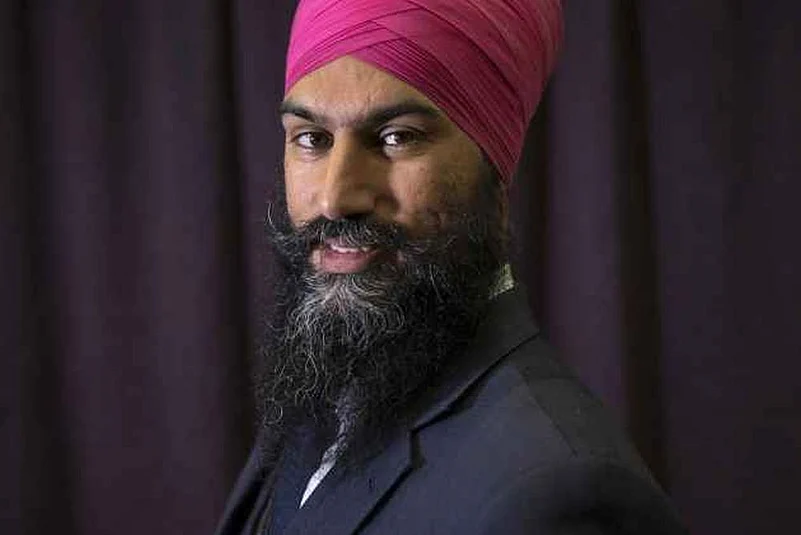Jagmeet Singh, the first non-white politician elected to lead Canada's left-leaning New Democrats, and in race to become the Prime Minister of the country, is reported to have links with a pro-Khalistani Sikh rapper.
Chani Natt, the Sikh rapper from Canada, has songs to his credit that evinces the need for an independent homeland for Sikhs, and glorify Khalistani militants, a report by the Toronto Sun said.
Natt, it is alleged, has personal ties with Singh who had, early in his political career, lobbied the Ontario government to recognize the 1984 anti-Sikh riots in India as an act of genocide.
A few videos of Natt's songs glorify khalistani militants during the Sikh freedom struggle, show men wearing T-shirts that read 'India's Most Wanted', repeatedly use words like 'AK-47' and promote violence, and show an actor shooting the first female Prime Minister of India Indira Gandhi.
Another song ends with a warning, 'Don't get yourself killed'.
One of his songs also has reference to Jarnail Singh Bhindranwal , whom the Indian government had termed 'terrorist' but Khalistani activists have called a martyr.
Bhindranwaala, a militant leader was killed by an Indian military raid in Golden Temple, ordered by Indira Gandhi in the infamous Operation Blue Star in 1984. In his song, Natti says, "Indira Gandhi wanted them (Khalistani militants) to be dead. Eventually, she was the one to be killed.'
Then Prime Minister Indira Gandhi had ordered a military raid in the Golden temple, a sacred place of worship for the Sikhs, and a hotbed of the Khalistan independence movement. Gandhi was later assassinated by her two Sikh bodyguards, which prompted an anti-sikh riots in the country.
Natt has, multiple times, shared pictures with Singh on social media platform Instagram. One of the picture was captioned, "Full support." The other, "Looked up to this guy for a while !! Never thought we would become friends one day and hangout . It's an honour to have him as a brother."
Jagmeet Singh has, in the past too, accused of being associated with Sikh extremists. His approach to the controversial demand of a sikh separatists for an independent homeland termed 'Khalistan' toned down after he was elected as the first non-white politician to lead a major political party in Canada.
Two days ago, Singh openly rejected the glorification of the 1985 Air India bombing mastermind Khalistani militant Talwinder Singh Parmar who was convicted of the attack that left 329 people dead — 268 of them Canadians.
In an interview with CBC's Terry Milewski last October, Singh had refused to denounce extremists within Canada's Sikh community who glorify Parmar's memory. Many gurudwaras in Canada have pictures of Parmar and other Khalistani militants on their walls.
Day after a video of Singh attending a Sikh independence rally in 2015 that glorified militants of Operation Blue Star, including Bhindrawal. ignited controversy, the NDP leader retracted his earlier statements, and denounced the bombing of Air India in 1985 by Khalistani militants.
"While the Air India Inquiry did not result in convictions, its findings identified a man named Talwinder Singh Parmar as the mastermind of the attack I accept those findings and condemn all responsible for the horror they inflicted," he said.
Canada’s Trudeau government has often been accused of being a Khalistani sympathiser. Prime Minister Justin Trudeau's maiden visit to India this year had only weakened the strained ties between the two countries.
Trudeau, in his visit to Punjab Chief Minister Amarindar Singh had assured his country does not endorse any kind of extremism. However, in a major diplomatic faux pas, a convicted Khalistani terrorist Jaspal Atwal, who was active in the banned International Sikh Youth Federation, was seen posing with Trudeau's wife Sophie Trudeau at an event in Mumbai.
Jaspal was also invited for a formal dinner with the Canadian Prime Minister, hosted by the Canadian High Commissioner. The invite was later rescinded.
A cover story by Outlook Magazine spoke in detail of a real threat of Khalistani terror, fuelled and funded by foreign gurudwaras patronised by liberal white politicians.
Why are overseas gurudwaras banning Indian authorities—not just politicians, even diplomatic functionaries? Is there a new mistrust on all sides? What exactly is going on in Canada and the UK, two countries that host the Sikh community’s busiest hubs outside India?
Hardliners mince no words, saying it’s meant to prevent Indian mission officials from “running pro-India and anti-Khalistan propaganda”. That speaks of a much higher level of ideological hardening—and counter-engagement—than may have been suspected by common Indians.

























